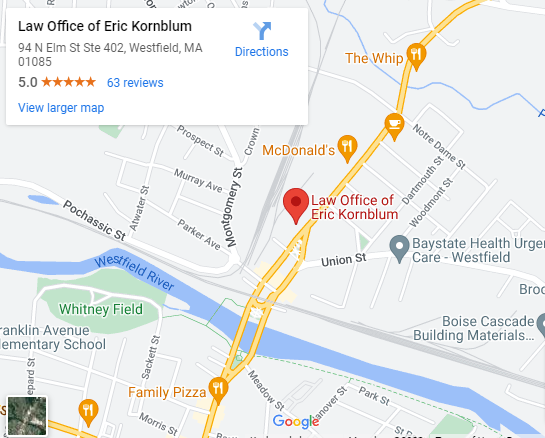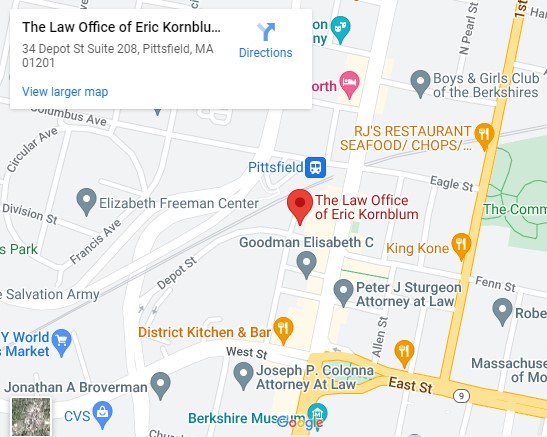Conquer bankruptcy with knowledge of the role of a bankruptcy trustee in Chapter 7
It is not uncommon to be in debt every once in a while. But if you owe multiple people large sums and cannot pay them back whatsoever, then it becomes a real issue. A situation like this may call for something drastic, like filing for bankruptcy. Although bankruptcy filing is an effective and legal way to erase your debts, there is a lot you need to know about it before submitting your petition, like what is the role of the bankruptcy trustee in Chapter 7 in Springfield, Massachusetts.
Filing for bankruptcy requires skillful attention to detail. It can get very complicated, especially if you encounter terms that you do not know. Hiring a bankruptcy attorney would be helpful as it gives you access to great legal advice whenever you are unsure of what to do next.
So if you want the process of filing Chapter 7 bankruptcy to be easy, you need to start a conversation with Eric Kornblum at his law office today. Call us now, and we will help you achieve debt relief quickly!
Why Do I Need a Massachusetts Bankruptcy Attorney?
Student loans, credit card debt, and hospital bills are just some of the financial struggles Americans usually deal with. Bankruptcy filing may be the only option for some to get rid of debts like those, and being with a bankruptcy lawyer also provides the only way to have everything processed smoothly.
When working with Eric Kornblum, you will be with someone who looks out for his client’s welfare and is fully aware of how challenging the process can be. More particularly, you have a Springfield, MA, attorney on your side who:
- Possesses the necessary experience in resolving different types of financial issues
- Is a firm believer in representing clients aggressively yet compassionately
- Goes above and beyond in helping every client get back on their feet financially
- Does whatever is possible to minimize the stress felt during the bankruptcy process
- Explains in detail what is the role of the bankruptcy trustee in Chapter 7
- Walks you through everything on your during the bankruptcy proceedings
- Lets you know of any Chapter 7 exemption that applies to your bankruptcy case
If a competent Chapter 7 bankruptcy lawyer is who you want to get legal assistance from, contact our bankruptcy law firm to start a conversation with Eric immediately!
What is Chapter 7 Bankruptcy?
Per the United States Bankruptcy Code, Chapter 7 bankruptcy is a federal legal process by the US government that provides a debtor to achieve debt relief through selling non-exempt (unprotected by bankruptcy exemptions) property you own. Also called liquidation, individuals who petition for Chapter 7 bankruptcy aim to get a fresh start quickly since it can get rid of your debt in as little as 3 to 6 months.
To be eligible for Chapter 7 bankruptcy protection, you and your partners (if any) must appear before the bankruptcy court and follow any orders within 180 days before submitting your bankruptcy petition. You must also undergo counseling from an approved credit counseling agency 180 days before filing unless you qualify for an exception.
Lastly, you should pass a Chapter 7 means test and a totality of the circumstances test to see if your current situation qualifies you to file for this type of bankruptcy.
Ask a skilled bankruptcy attorney for answers on how to file for Chapter 7 bankruptcy and other related concerns.
What Role Does a Bankruptcy Trustee Have in a Chapter 7 Bankruptcy?
The primary function of the Chapter 7 bankruptcy trustee would be to manage all your non-exempt property and to locate and sell assets for the benefit of your creditors. When filing, ensure you fully understand what may happen to your assets since Chapter 7 does not give you an automatic right to dismiss.
On the other hand, the debtor’s primary responsibility during the bankruptcy proceedings would be to work with the Chapter 7 trustee and provide any additional information to the bankruptcy court regarding your finances. It is crucial to consult with a bankruptcy lawyer to determine which of your properties are exempt and to know what is the role of the bankruptcy trustee in Chapter 7 in Springfield, Massachusetts.
Aside from being the bankruptcy administrator, the following are other important tasks performed by a Springfield, MA, bankruptcy trustee for Chapter 7:
Reviews your bankruptcy petition
During the bankruptcy procedure for Chapter 7, you have to disclose some financial and personal details such as your income, property, debts, the status of your bankruptcy schedules, and documents. The bankruptcy trustee will review your petition and verify if everything you disclosed is true using everything you provided.
For instance, the Chapter 7 trustee will check your tax returns and pay stubs to determine if the monthly income you declared is accurate.
Examines you during the creditors’ meeting
Roughly one month after filing your bankruptcy case, you need to attend the 341 meeting of creditors conducted by the Chapter 7 trustee. During the meeting, the trustee will ask you questions about the information you put in the forms you filled out and the documents you submitted while you were under oath.
It is also worth mentioning that unless you are suspected to be hiding some properties, creditors usually do not attend this meeting.
Recovers your pre-bankruptcy payments
The Chapter 7 trustee also finds money for creditors by evaluating property transfers and payments made 90 days before bankruptcy filing if the transfer reaches threshold amounts. It can be extended to up to a year if your creditor is a family member, business partner, or someone within your inner circle.
When the trustee finds a preferential transfer, the creditor will be ordered to return the property or money to the bankruptcy estate.
Checks your liens
A lien ensures that a property’s title cannot be transferred by paying a secured loan first. This is important since family members or friends usually forget to record liens and prepare loan documents correctly.
Speak to a bankruptcy attorney to learn more about liens and other relevant information.
Call our Springfield, MA, Bankruptcy Lawyer Now!
There is no denying how troublesome it is to be in so much debt. While there is no guarantee that a bankruptcy lawyer can eliminate all your financial issues, they can help lessen your stress. Contact Eric Kornblum’s law office if you need a competent bankruptcy lawyer. You will have an attorney ready to examine your bankruptcy case.
Erin Kornblum has intimate knowledge of the Massachusetts legal system and has over two decades of bankruptcy law experience. If you need legal advice on how to pass the Chapter 7 means test, finally get rid of your student loans, or more bankruptcy-related concerns, you have the man for the job!
Call our law firm now to schedule a conversation with a Springfield, MA, bankruptcy attorney!

 MA bankruptcy lawyer Eric Kornblum graduated from State University of New York, Binghamton in 1989 and received his law degree in 1992 at Western New England College, School of Law. Since opening his own practice, Eric has been dedicated to helping his clients resolve their financial problems both in and out of court.
MA bankruptcy lawyer Eric Kornblum graduated from State University of New York, Binghamton in 1989 and received his law degree in 1992 at Western New England College, School of Law. Since opening his own practice, Eric has been dedicated to helping his clients resolve their financial problems both in and out of court. 
